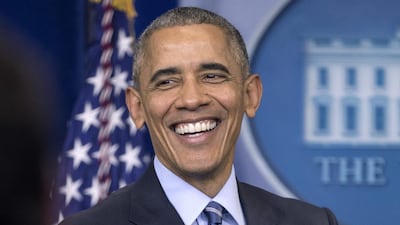As the world looks on at the horrors of Aleppo and the recapture of the ancient city of Palmyra by ISIL, commentary by global leaders has not been in short supply. The United Nations secretary-general, Ban Ki-moon, has said that “Aleppo is now a synonym for hell”, and that Syria represents “a gaping hole in the world’s conscience”.
Barack Obama joined in at his last press conference. He placed the blame squarely on Bashar Al Assad and his allies, Russia and Iran, but added that he would always feel some personal responsibility too.
Harsh though it may be, I would say yes: he certainly should. For whereas the ability of Mr Ban to bring an end to the Syrian civil war was limited, given the lack of unity in the UN Security Council, Mr Obama did have the power to intervene decisively, but chose not to do so. And a sin of omission can be just as bad as a sin of commission.
This goes back to the start of the conflict, when optimism that Mr Al Assad was sure to fall quickly was seriously misplaced. It became clear very soon that there were in fact only two serious options.
The first meant proper backing for the Syrian opposition: no fly zones, serious military assistance, and almost certainly Western boots on the ground. This would have constituted a clear determination to boot out Mr Al Assad, and would have required working very closely with Arab states to ensure that the action was seen to have regional legitimacy and didn't seem like another ill-conceived external intervention.
Mr Obama appeared to acknowledge this at the press conference, when he said: “Unless we were all in and willing to take over Syria, we were going to have problems. Everything else was tempting because we wanted to do something and it sounded like the right thing to do, but it was going to be impossible to do this on the cheap.”
But here is the problem. The only viable alternative to going “all in” was to do nothing at all. It was to be grimly realistic about the balance of, and the determination to cling to, power in Syria.
That second option – to do nothing – was to recognise that Mr Al Assad had no reason to give in, that he would fight to the end or close to it, and that forces loyal to the regime were significant, not least the religious and ethnic minorities who feared a Sunni dominated government. On this view, Mr Al Assad always had to be a part of the solution.
Both were hard choices. Mr Obama, alas, avoided both of them.
He tried to steer an in-between course that has led us to where we are today. He offered enough support to the opposition – that is, when the US could identify which rebels it found acceptable – to give them hope, but nothing like the assistance necessary for them to make a difference on the ground.
Other efforts to help have been farcical. When Gen Lloyd Austin, commander of US central command, was asked by the Senate armed services committee in 2015 how many Syrians had graduated from a programme to train them to fight ISIL, and were now actively doing so, he replied: “We're talking four or five.” The programme was scrapped the following month.
The abandonment of Mr Obama's “red line” over the use of chemical weapons in Syria contributed further to the impression that his administration lacked resolve and conviction – and not just in Syria. US guarantees around the world were then viewed as being somewhat less than ironclad, for as the Wall Street Journal remarked over the weekend: “There never seem to be foreign policy consequences in this administration.”
That is not entirely fair. In many ways Mr Obama is a likeable and admirable character – intellectual, more clear-eyed about culture and religion, and more instinctively tolerant than most of his contemporaries in US politics. His early efforts to reach out to the Islamic world were particularly commendable, coming from a leader whose middle name is Hussein and who has constantly had to battle false accusations that he was not born in America and that he is in fact a Muslim (not regarded as a plus by a majority in his country).
He has been admirably pragmatic in dealing with many allies, stressing human rights issues far less in public than other Democratic party leaders would have done, perhaps realising from his childhood in Asia that finger wagging lectures from superpowers are more likely to antagonise governments of developing countries and that pressure is more likely to be effective if applied privately.
But in terms of Syria he has tried to have it every way and succeeded in none.
America's line should have been clear. Instead it was completely hazy. If he had chosen one of the two courses above the situation would have been resolved much more quickly and with far less loss of life.
Whatever the rest of us think, Mr Obama still believes in American leadership. On Syria he showed far too little. Well intentioned he may have been, but if Syria is seen as a black mark on his legacy it will be well deserved. Yes, Mr President: you are responsible.
Sholto Byrnes is a senior fellow at the Institute of Strategic and International Studies, Malaysia


